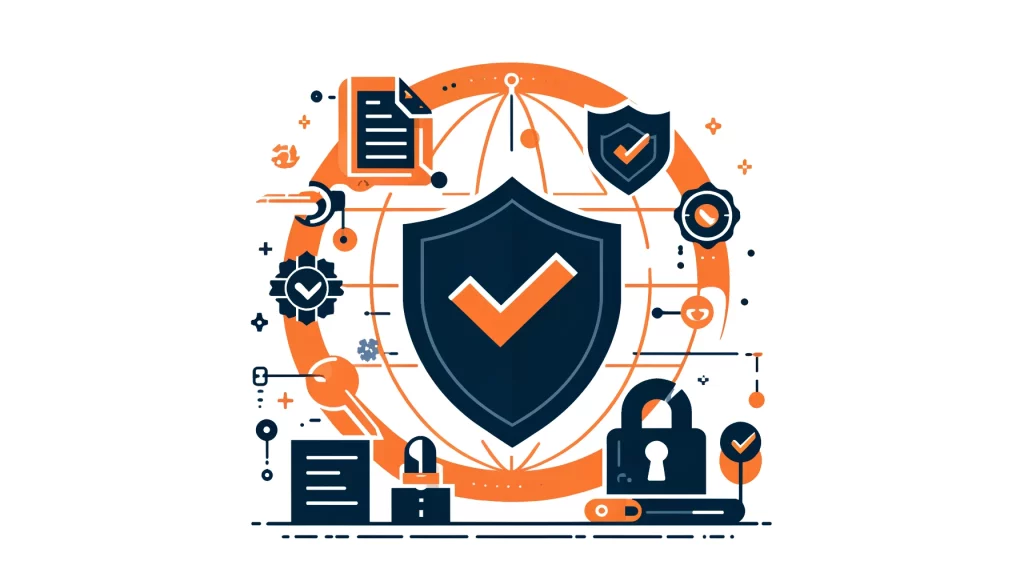
Data Security Compliance

Data security compliance means following rules to keep data safe and secure. This includes protecting data confidentiality, integrity, and availability according to industry standards and regulations. Compliance involves following policies, procedures, and practices.
What is Data Security Compliance?
Data security compliance is the process of adhering to a set of rules and guidelines that dictate how data should be handled, stored, and protected.
These rules and guidelines are established by various regulatory bodies, industry associations, and government agencies.
The goal of data security compliance is to ensure that important information is kept safe and private. It also aims to restrict access to only authorized individuals.
The healthcare industry must follow HIPAA. HIPAA sets guidelines for protecting patient health information.
The financial industry must comply with the Payment Card Industry Data Security Standard (PCI DSS). This standard establishes guidelines for safeguarding credit card information. It outlines rules for securely storing credit card data. Compliance with PCI DSS ensures that credit card information is kept safe.
Why is Data Security Compliance Important?
Data security compliance is essential for several reasons. First and foremost, it helps protect sensitive information from falling into the wrong hands.
A data breach can have devastating consequences for a business, including financial losses, reputational damage, and legal liabilities. By complying with data security standards, businesses can reduce the risk of a data breach and protect their customers’ trust.
Moreover, data security compliance is often a legal requirement. Many industries are subject to strict regulations that mandate the protection of sensitive data. Failure to comply with these regulations can result in hefty fines, legal action, and even criminal charges.
The GDPR is a regulation by the European Union. It imposes harsh penalties on companies. These penalties are for failing to protect the personal data of EU citizens.
Data security compliance also helps businesses maintain a competitive edge. Customers are realizing how important it is for companies to protect their data and keep it secure. They prefer to do business with companies that make data privacy and security a top priority.
Businesses can set themselves apart from competitors and earn customer trust by showing a dedication to data security compliance.
Common Data Security Regulations
There are several data security regulations that businesses must be aware of, depending on their industry and location. Some of the most common regulations include:
HIPAA is a law that protects patient health information in the healthcare industry.
GDPR is a law that keeps personal information safe for people in the European Union. It applies to all companies that handle this data.
PCI DSS sets rules for handling credit card data securely in the financial industry.
SOX: The Sarbanes-Oxley Act sets standards for financial reporting and internal controls in publicly traded companies.
The CCPA allows people in California to find out what personal information is being collected about them. It also lets them know how that information is being used. The law gives them the right to know this information. They can learn about the data being collected and its purpose.
Implementing Data Security Compliance
Implementing data security compliance requires a comprehensive approach that involves people, processes, and technology. Here are some key steps that businesses can take to ensure compliance:
Identify Sensitive Data
The first step in implementing data security compliance is to identify the sensitive data that needs to be protected. This may include customer data, employee data, financial data, and intellectual property.
Businesses can implement appropriate security controls to protect the sensitive data once they have identified it.
For example, a healthcare provider may need to protect patient health information, such as medical records and test results. To comply with HIPAA, the provider may implement access controls, encryption, and secure data storage practices.
Develop Policies and Procedures
Next, we need to create rules for how to handle, store, and protect sensitive data.
The policies need to follow industry standards and regulations. All employees who handle sensitive data should clearly communicate them as well.
For instance, a bank may create rules for how to deal with credit card information following PCI DSS guidelines.
The rules may require you to protect payment machines. You may also need to encode data when it is being moved and when it is stored. Additionally, you should regularly check security measures.
Implement Security Controls
Businesses must implement security controls to protect sensitive data once they establish policies and procedures. These controls may include access controls, encryption, firewalls, intrusion detection systems, and other security technologies.
A retail company can use point-to-point encryption to protect credit card data. This encryption keeps the data safe as it is sent from payment terminals to processing systems.
The company might use tokenization to replace sensitive data with a unique identifier, which makes it less valuable to attackers.
Train Employees
Employees play a critical role in data security compliance. Employees must receive training on how to handle sensitive data, as well as the policies and procedures that govern it. They should also learn about best practices for security and privacy.
Regular training and awareness programs can help ensure that employees understand their responsibilities and are equipped to handle sensitive data safely.
For example, a healthcare provider may conduct annual HIPAA training for all employees who handle patient health information. The training may cover topics such as data privacy, security best practices, and incident response procedures.
Monitor and Audit
Businesses need to regularly check and review their data security efforts to make sure they are working well and current.
Regular security assessments and audits can find weaknesses and areas to improve. Monitoring tools can quickly detect and respond to security incidents.
For example, a financial institution may conduct regular penetration testing to identify weaknesses in its security controls. The institution might also use SIEM tools to watch network activity and find strange behavior.
Conclusion
Data security compliance is a critical issue for businesses of all sizes and industries.
By implementing appropriate policies, procedures, and security controls, businesses can protect sensitive data, comply with regulatory requirements, and maintain the trust of their customers.
However, data security compliance is an ongoing process that requires constant vigilance and adaptation to new threats and challenges.
Businesses must invest in data security compliance to stay ahead of changing threats and regulations. This investment is necessary to keep up with the game.
This may require a significant investment of money and expertise. The benefits are clear: reduced risk, increased customer trust, and a competitive edge in the market.
By prioritizing data security compliance, businesses can safeguard their most valuable assets and position themselves for long-term success.
